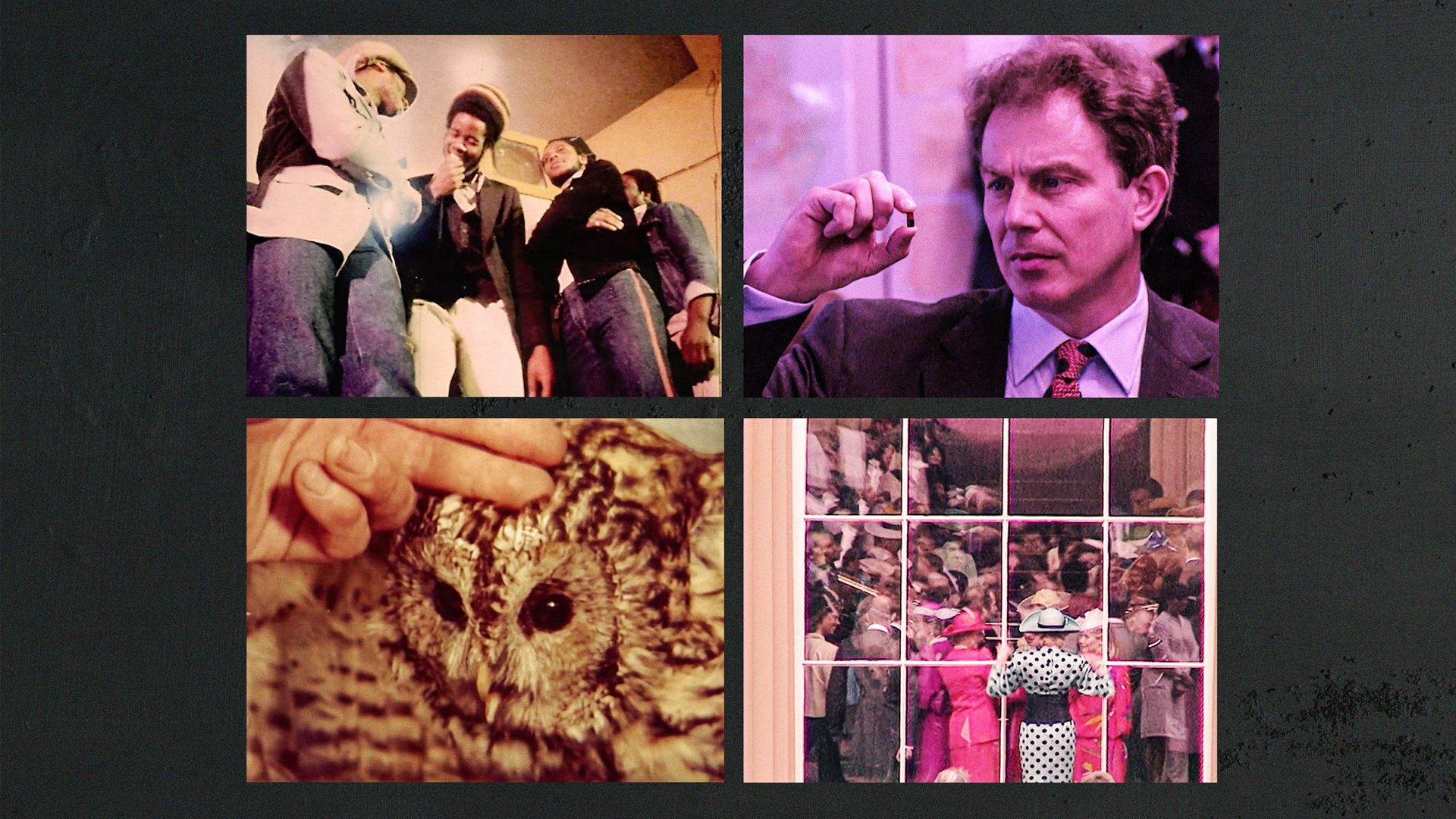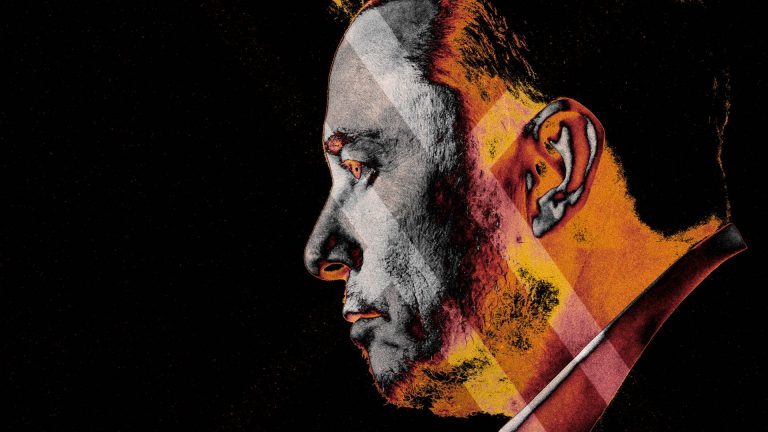The past is a foreign country: they have a different resolution on their television screens there, as LP Hartley might have once said. Watching Adam Curtis’ new television series Shifty, the viewer is gifted a remarkable portal into a world at once both strangely familiar and completely odd.
It’s a Britain of declining industries, repeated economic crises, racial tensions and mass unemployment. But it’s also a place of new, exciting technology (“it’s called electronic mail”) and grass-roots cultural expression. House parties are a recurring theme, whether they’re suburban line-dancing or punkish moshing. Spun together, Shifty comes across like The Rock ‘n’ Roll Years as filmed by the great experimentalist Chris Marker.
We begin with Jimmy Savile hustling children – their faces blurred out by our future knowledge of his crimes – into Maggie Thatcher (milk snatcher)’s presence. It is one of the many juxtapositions which are Curtis’s trademark tool for driving home his points.
It reminds us that while there might be conspiracies that were invented – Jack the Ripper was probably not a member of the Royal Family, as someone claims in an early episode – there are plenty of conspiracies to go round and some of them are true. As Thomas Pynchon once wrote: “If they get you asking the wrong questions, they don’t have to worry about you getting the right answers.”
Curtis doomscrolls through the last three decades of the 20th century, starting with Thatcher’s rise to power. I lived through this period, but watching the clips of people made me realise that the 1980s were just the 1950s with more electricity. Everyone speaks in clipped and breathless voices, like parodies from The Two Ronnies.
We see a woman reporting a rape, filmed being bullied by police. They want her to admit she made it up, grilling her about her sexual background and her mental health. One of them shouts at her: “Gretel could make up better fairy tales.”
We see communities of black and Asian people routinely ridiculed on television and then violently assaulted in the streets. Thatcher’s pursuit of “monetarism” only worsens Britain’s industrial decline and the latter stage of her neoconservatism rips society open to the booms and busts of late-stage capitalism.
It is fitting that each episode ends with an acknowledgement to the chroniclers of the period, using the new technology to preserve these slices of history. The fondness here comes from the fact that these would have been the men and women who Curtis himself began to work with at the BBC.
Suggested Reading


Style over substance? Why Adam Curtis is TV Marmite
He started his career on Esther Rantzen’s popular consumer TV show That’s Life, which mixed jokey segments on dogs saying “sausages” with complaints about naff products, and more serious journalistic investigations of wrongdoing. From trainee, Curtis rose to a segment producer and went on to make programs for Inside Story and 40 Minutes, as well as making his own independently conceived material.
Curtis has won four BAFTAs for his work, which is characterised by an inventive use of archive material. Films such as All Watched Over by Machines of Loving Grace, Can’t Get You Out of My Head and HyperNormalization give us hypnotic visions of a chaotic reality while promoting sweeping, ambitious theories which claim to decode the hidden patterns therein. They are usually accompanied by his own narration, which tends to sound like a bored uncle explaining a Sunday Times article to an enthralled nephew on a long car journey.
Shifty forgoes this implacable narration, using text to make his larger points and here we shall pause, because it has to be said, there’s something a bit dubious both about the modus operandi and the claims made.
First, there’s the problem with context. Archive footage provides local colour but not really context. It’s the television equivalent of anecdotal evidence.
There’s a woman meditating with the sound of a road digger outside, so anyone trying to meditate is a deluded wally. The liberal elite retreat from the working class, we are told, followed by a snippet of an interview of Martin Amis sounding like a smug arse. Leave aside the fact it’d be difficult to find an interview of Martin Amis not sounding like a smug arse, was he really representative of liberal intelligentsia? I always thought of Amis as consistently reactionary. Or did I miss the radical leftwing subtext of The Rachel Papers?
The juxtaposition of Princess Diana’s bulimia with the consumerism of the ‘80s is adolescent and tasteless. The claim that “privatisation was invented by the Nazis” isn’t, strictly speaking, true. (The Nazis prioritised privatisation but the concept of putting state property into the hands of private businesses long predated them.)
We’re also told in a segment on Stephen Hawking’s scientific discoveries that “now atoms can be what they want”, which again isn’t exactly right. As in it’s wrong.
This kind of overreach is impressive to someone who hasn’t thought about politics ever. A door slam that ends an argument that’s gone on too long. But isn’t there a whiff of Joe Rogan’s mighty musk? Doesn’t it end up adding to the problem?
Isn’t it precisely the sort of “shiftiness” which Curtis exposes in the likes of Rupert Murdoch, Margaret Thatcher and the Duke of Westminster – a frightful oik who was back then the second wealthiest person in Britain after the Queen – that he is guilty of himself?
The markets are chaotic and out of control, Curtis says. The media can be manipulated and remixed like one of Trevor Horn’s endless versions of a Frankie Goes to Hollywood song, but surely that also counts for the documentary. Aren’t we all inside what we are looking at?
In the end, Curtis reminds me of the pseudoscientific author of Fingerprints of the Gods, The Message of the Sphinx, The Mars Mystery and many more. He is the Graham Hancock of political filmmaking. Curtis is the outsider who says he has worked it all out, but won’t let us check his bibliography.
Beyond the bounds, neither left nor right (it always ends up being right), this sweeping series is excellent and entertaining, beguiling and maddening, just like the decades it portrays.
Adam Curtis’s Shifty is on BBC iPlayer now











